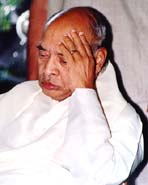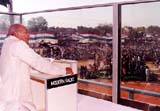'While nobody was opening their mouths in other parties,
mouths
were wide open in the Congress'
 Why was this?
Why was this?
I knew there would be criticism of me, not only from outside
the party, but also from within. And I expected some of this
criticism to be extra harsh.
People would say that I kept appealing because I had a weak case
and was taking refuge in technical matters.
So, when the latest summons came, I made up my mind to resign.
Was it a decision made on the spur of the moment?
I had been thinking about it for a long time. But I took the
final decision after the last judgment.
It had come in a way that I thought that it would affect the image
of the office of Congress president if I pursued the legal options
while remaining president of the party.
You see, the Congress president's post is different from others.
It used to be called rashtrapati in the old days. There is just
one in the whole country. I felt it was important to maintain
the image of that office regardless of whether or not I thought
there was a case against me.
Do you believe that it would have compromised the dignity of
the office?
Well, leaders in other parties do not think so. Mr Advani
feels he can continue as president of the BJP despite the chargesheets.
And several others in other parties have taken similar positions.
But in my case, there were two other factors. Firstly, I did not
consider it proper for me to continue and was unhappy with the
precedent it would set.
Secondly, in other parties, those leaders who felt that they had
been falsely accused were not under harsh criticism from their
own party members.
While nobody was opening their mouths in the other parties, mouths
were wide open in the Congress. But that is the way it is in the
Congress. Everything is open. Nothing is done quietly or in secret.
It is done on the front page of newspapers.
Yes, that's right (laughs). Our troubles are very useful in
sustaining you people in the press.
Did your astrologers predict you would step down?
I do not attach too much importance to what astrologers say.
In my case, they have never been right. Perhaps, my birth date
is inaccurate (laughs).
Nobody predicted I would be prime minister. Why prime minister?
Nobody even predicted I would be chief minister.
Why then did you leave it to your astrologer Raghavendra Rao
to negotiate the alliance with Jayalalitha?
I have seen your interview where she says this. But it is factually
incorrect. I never sent Raghvendra Rao to her. He never represented
me.
Who negotiated the alliance?
I did. We both did. She and I spoke on the phone and decided
to renew the alliance which she had earlier, unilaterally declared,
was over.
It was done at our level. There were no intermediaries and no
middlemen.
Did you expect the Congress to fare so poorly at the last elections?
No I did not.
To what factors would you attribute the Congress's poor performance?
 I think this question has a long answer which has been given
by many political commentators, party activists, intellectuals
and observers.
I think this question has a long answer which has been given
by many political commentators, party activists, intellectuals
and observers.
In a nutshell, the reasons were both internal and external. So
far as I am concerned, the real answer has to come from the voter
himself on herself. I have asked many of my workers to find out
from the 'master' himself, but this exercise has not been completed.
At some point, I propose to participate in this very absorbing
exercise myself, if only to see how near or how far removed the
leaders are from understanding the 'master's mind.'
The decision to ally with the AIADMK in Tamil Nadu led first,
to a revolt in the party and then, to an electoral debacle. Do
you regret that decision? Or do you think that given the situation
that prevailed in the pre-election period, it was a valid decision?
Political parties have to think in terms of options or alternatives.
The CWC, I think, had no viable alternative to what it decided
to do. There could, of course, be difference of opinion on this.
So be it.
How much damage did hawala do to the Congress? Could this have
been avoided?
Damage was done. It could not be avoided, in my view.
|





 Why was this?
Why was this?
 I think this question has a long answer which has been given
by many political commentators, party activists, intellectuals
and observers.
I think this question has a long answer which has been given
by many political commentators, party activists, intellectuals
and observers.